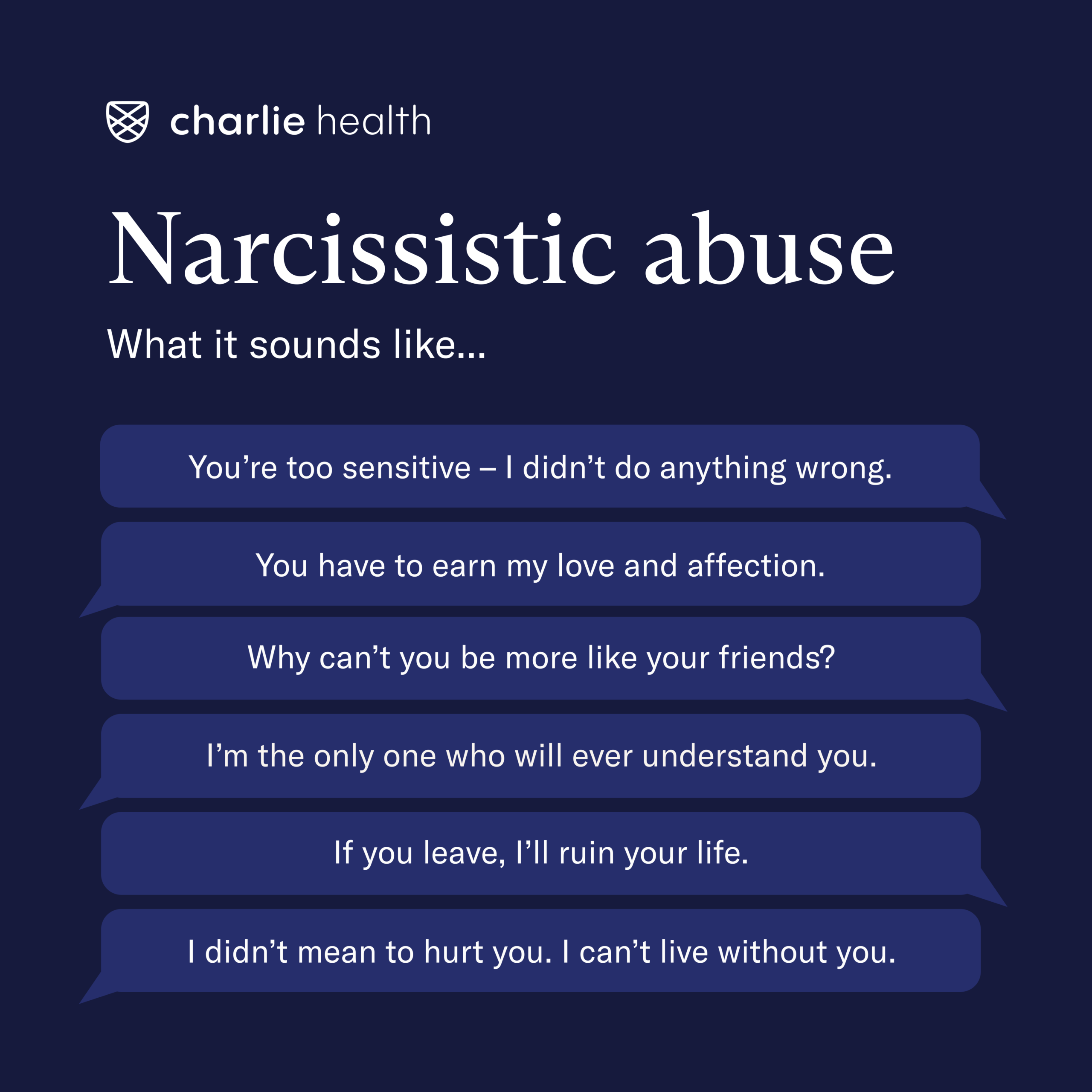
Table of Contents
Signs and Symptoms of the Narcissistic Abuse Cycle

Written By: Sarah duRivage-Jacobs

Clinically Reviewed By: Dr. Don Gasparini
March 11, 2023
5 min.
Until recently, narcissistic abuse had been a concept mostly found on social media, forums, psychology blogs, and in self-help books. Here are the facts.
Learn more about our Clinical Review Process
Table of Contents
What is narcissistic abuse?
Until recently, narcissistic abuse had been a concept mostly found on social media, forums, psychology blogs, and in self-help books. However, in February and March of 2023, the concept of “narcissistic abuse” entered the mainstream cultural zeitgeist. All of a sudden, hundreds of people are searching for education. But because there isn’t much trustworthy information available, many internet researchers may be coming up short.
Narcissistic abuse is any abuse experienced in a relationship with someone who has narcissistic traits.
Importantly, however, neither a diagnosis of narcissistic personality disorder (NPD) nor any psychiatric disorder is necessary for someone to be capable of physically, emotionally, or sexually abusive behavior. And a diagnosis of NPD does not mean someone will automatically be a narcissistic abuser.

We help survivors of abuse heal from home
Personalized treatment for teens & young adults
In 2021, researchers Sophie Kjærvik and Brad Bushman published a meta-analytic review in the American Psychological Association’s Psychological Bulletin that examined the associations between narcissism, aggression, and violence. They found that people with narcissistic traits (e.g., entitlement, grandiosity) had 21% higher levels of aggression and 18% higher levels of violence. This link was especially strong when people were threatened or provoked due to “thin skins” and extreme intolerance of criticism.
People who share their stories mostly touch on emotional abuse, of which aggression can be an example. Those who provide specialized support for narcissistic abuse recovery describe a cycle with three stages: idealize, devalue, and discard.
Idealize
The theory of the narcissistic abuse cycle begins with the “idealize” stage of emotional manipulation. If someone with persistent grandiose narcissistic tendencies assigns another person with status and value, they may pursue them very heavily.
What does narcissistic abuse feel like in the “idealize” stage?:
- Being on the receiving end of love bombing
- Having someone tell you they’ve never met anyone like you before and that you’re who they’ve been waiting for
- Hearing grandiose claims like “we are soulmates” early on
Devalue
The “devalue” stage contrasts starkly with the “idealize” stage, but it may begin slowly or only happen privately. If “idealize” is about building someone up, “devalue” is about starting to break someone down.
What does narcissistic abuse feel like in the “devalue” stage?:
- Being told they thought you were different and must have tricked them
- In their view, failing in comparison to exes or other friends or loved ones
- Hearing you were never good enough and aren’t worth the trouble

Discard
The “discard” stage is precisely what it sounds like—the abuser drops the person seemingly out of the blue. This stage may include verbal abuse, cold accusations, and other forms of emotional blackmail designed to shatter the person. It can be difficult, in this stage, to know what is real and what is manipulation because they’re so confident in their actions.
What does narcissistic abuse feel like in the “discard” stage?:
- Being called a “crazy bitch” or other mean names.
- Accusing you of cheating, lying, or otherwise being a bad person.
- Blaming you for their cold and calculated behavior.
What is narcissistic personality disorder?
Narcissistic personality disorder (NPD) is a type of personality disorder.

According to the American Psychiatric Association, a personality disorder is a category of psychiatric disorders that can be diagnosed when someone’s thoughts, feelings, and behaviors are considered “abnormal,” cause distress, and persist over time. Personality disorders tend to be more stigmatized than other mental health conditions.
The diagnostic criteria for NPD include at least five of the following forms of narcissistic behavior, starting by early adulthood:
- Grandiose self-importance
- Preoccupation with fantasies of love, beauty, power, success, brilliance
- Feelings of specialness and desire and need to be around other special people
- In need of constant and excessive admiration
- Entitlement to favorable treatment
- Exploitative of others
- Lack of empathy
- Envious and thinks others feel the same
- Arrogance
Although the complete diagnosis is commonly discussed in pop culture and the news, people can have traits of narcissism without being diagnosed with NPD.
It’s also important to note that NPD itself is a controversial diagnosis. Some experts see the diagnosis as too limiting for the multiple dimensions narcissistic personalities may encompass. Others say that grandiose narcissism (e.g., entitled, self-centered) and vulnerable narcissism (e.g., neurotic, introverted) shouldn’t be combined into one diagnosis. These complexities make research challenging, meaning the diagnosis may need further exploration in clinical care.
Do you need more support with
your mental health?
Charlie Health can help.
The effects of narcissistic abuse
Experiencing chronic physical, emotional, or verbal abuse of any kind—whether from a grandiose narcissistic parent or narcissistic relationship in youth, from intimate partner violence or domestic violence, or another form of an abusive relationship—can lead to:
- Depression
- Anxiety
- Post-traumatic stress disorder (PTSD)
- Complex post-traumatic stress disorder (CPTSD)
- Substance use disorders
- Suicidality
- Echoism (struggling to have a voice after a relationship with a narcissistic person)
The long-term mental health and other effects of narcissistic abuse are sometimes referred to as narcissistic abuse syndrome, but this isn’t diagnosable.
How to heal from narcissistic abuse at Charlie Health
Charlie Health can help you begin healing from narcissistic or any other kind of abuse.
At Charlie Health, we offer a virtual Intensive Outpatient Program (IOP) specially designed to support young people ages 11-30 in managing more severe mental health challenges. The IOP is more structured and intensive than standard weekly therapy sessions, but because it’s 100% virtual, it’s far more adaptable to your schedule than inpatient options.
Our clinicians specialize in caring for teens and young adults dealing with the aftereffects of abuse—including depression, anxiety, PTSD, substance use disorders, and suicidality. Your Care Team will personalize a Program encompassing individual therapy, family therapy, and supported groups—and pulling from a broad range of therapeutic modalities.
Whatever you or your child is experiencing, we will work together to develop a comprehensive and compassionate treatment program. Please reach out if you have any questions about how Charlie Health can help.
References
https://www.annualreviews.org/doi/full/10.1146/annurev-clinpsy-032816-045244
https://pubmed.ncbi.nlm.nih.gov/26780206/
https://cptsdfoundation.org/2022/08/16/narcissistic-abuse-complex-post-traumatic-stress-disorder/
https://www.vice.com/en/article/yw7xyy/echoism-narcissist-abuse-condition-psychological




